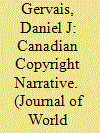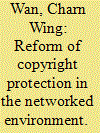|
|
|
Sort Order |
|
|
|
Items / Page
|
|
|
|
|
|
|
| Srl | Item |
| 1 |
ID:
085864


|
|
|
|
|
| Publication |
2008.
|
| Summary/Abstract |
Copyright policy, like other major areas of public policy, requires a solid anchoring in fundamental principles. The perceived need to anchor copyright debates in a solid policy context and, hence, to develop a coherent (and hopefully convincing) narrative has been the subject of excellent contemporary research. We are indebted to a number of scholars for their work in this area. The attempt to find normative applications from a historically derived model for copyright is not either. However, the research thus far tends to provide a blurred picture, by espousing justiflcatory theories based on one or many of the following: commercial and personal Interests of authors, understood as property and/or liability rules; commercial interests of publishers and other "rights holders"; and/or the social costs of overprotection and the related economic-driven search for an optimal point of protection. This article looks at pieces in the Canadian narrative puzzle and tries to present a faithful picture of its current stage of evolution. To do so, however, a detour via England is required, because that is whence the soil from Which the Canadian narrative comes. This historical detour will be the focus of Part 1. Part III will suggest a path for the next stages of the Canadian narrative that is both consistent with international norms and hopefully useful in moving the debate forward. The part ends with a brief look at the impact that the linkage with trade rules may have on copyright.
|
|
|
|
|
|
|
|
|
|
|
|
|
|
|
|
| 2 |
ID:
085865


|
|
|
|
|
| Publication |
2008.
|
| Summary/Abstract |
Cross-border collective management has recently been a highly discussed topic, in particular from the perspective of competition law. This article focuses on the less discussed issue-the problem of the territoriality principle in cross-border collective management. Territoriality of substantial copyright laws leads to the need for collecting societies to check the initial ownership, scope of rights, etc. under each national copyright law. In addition, territoriality of the collective management laws (as distinguished from substantial copyright laws) requires the societies to adhere to multiple laws differently regulating establishment, functioning, accountability, etc. of the societies. The article analyses the possible solutions to these problems.
|
|
|
|
|
|
|
|
|
|
|
|
|
|
|
|
| 3 |
ID:
085863


|
|
|
|
|
| Publication |
2008.
|
| Summary/Abstract |
The Agreement on Trade-Related Aspects of Intellectual Property Rights is the most important as well as the most controversial instrument to date concerning intellectual property protection. What is not clear is the impact it will have on developing countries and whether it will actually meet its objective in the "… promotion of technological innovation and to the transfer and dissemination of technology …". The proponents of a strong patent regime vehemently argue that strengthening patent protection will lead to greater technology transfer in developing countries, and consequently inflow of foreign direct investment (FDI) as it is the most important channel for technology transfer. This article takes the Indian pharmaceutical industry as an example to examine the above assertion, and argues that simply enhancing patent protection may not necessarily result in a corresponding increase in FDI in the Indian pharmaceutical sector. It shows that in addition to strong patent protection, there are equally or even more important factors that have a bearing on the inflow of FDI.
|
|
|
|
|
|
|
|
|
|
|
|
|
|
|
|
| 4 |
ID:
085866


|
|
|
|
|
| Publication |
2008.
|
| Summary/Abstract |
On 15 April 2008, the Hong Kong government released its preliminary proposals on Copyright Protection in the Digital Environment, which cover the civil and criminal liabilities of online infringers and the role of online service providers (OSPs) in combating internet piracy. The preliminary proposals favor OSPs and users more than copyright owners. The government proposes that the OSPs, the content industries and users should voluntarily create a code of practice which defines the role and scope of OSPs in the fight against online piracy. The OSPs oppose any rules making them liable for copyright infringement and the safe harbor provisions. The content industries, in contrast, insist that, in line with international norms, both OSP liability and safe harbor provisions be written into the code of practice. I argue that, in the absence of any assignment of legal right to any party, the Coase theorem predicts that negotiations will fail. The key issue is which party should bear the transaction costs of copyright enforcement, because there are millions of online infringers; however, if the transaction costs of enforcing copyright in the networked environment are prohibitively high, the credibility of the copyright system will be undermined and online piracy will become commonplace.
|
|
|
|
|
|
|
|
|
|
|
|
|
|
|
|
|
|
|
|
|